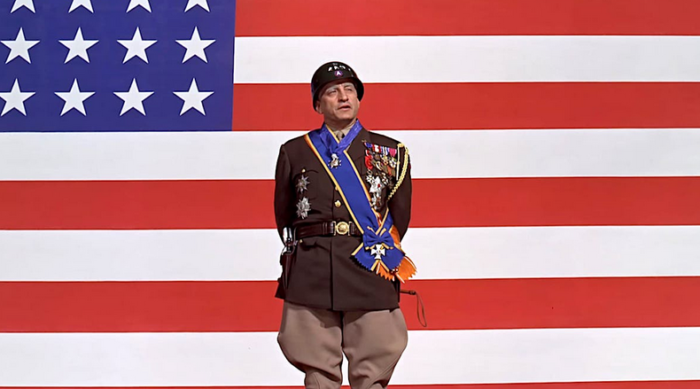
The 43rd Academy Awards (1971)
Nominations: 10
Wins: 8
I have this weird memory about Patton. Well it’s either a memory or a dream. It was this time my dad took out a DVD copy of Patton, played Patton’s opening speech, and then turned off the movie. I don’t know why we didn’t watch the whole movie. Which is why I wonder if I’m misremembering this event. If not, it seems like the takeaway is my dad believed this opening scene was so well acted it was required viewing for a young film fan like myself. Even if it’s the only part of the movie I see.
Why it took me this long to watch a movie my dad loved so much I can’t say. I remember it was the third DVD we ever bought–after Casablanca and T2: Judgement Day. I think the subject matter felt too adult, the length too overwhelming, what if I was bored and didn’t love it like my dad did? Well now I have seen the film and I’m happy to report this movie isn’t boring. The film has a sharp script co-written by a pre-Godfather Francis Ford Coppola, a powerful score from Jerry Goldsmith, and one of the most compelling lead performances of its time.
The film tells the story of legendary (and controversial) tank commander George S. Patton. From his successful campaign against German and Italian forces in North Africa, to being left out of D-Day for disciplinary reasons, to his heroic relief effort during the Battle of the Bulge, to him again being disciplined and stripped of command for comparing the American political parties to the Nazi party. We get to see what made Patton famous and infamous. This isn’t a puff piece by any means.
Going into this film I couldn’t really tell you anything about Patton. Now I know he was one of the great military strategists of his time. His maneuvers were often risky but highly effective. Unfortunately, his reputation was often tainted by his ego. A key moment being when Patton confronts a shell-shocked soldier and slaps him and sends him to the front lines. This was a move that deemed Patton to be emotionally unstable and he was taken out of command.
It’s a odd being so compelled by a character that you also kind of hate. Patton is such an asshole to his troops. He’s strict, cold and unsympathetic towards those around him, but he has moments. The scene that comes to mind is when Patton narrates a letter to the parent of a deceased young soldier. He wants his men to fight but he doesn’t take any man’s death lightly. He has plenty of compassion as both a spiritual man and a poet.
The film is technically impressive with vast exotic locales (the film was shot primarily in Spain), battle scenes with lots of bodies and pyrotechnics. The score and scope are sweeping. Though at the end of the day George C. Scott is why this movie should be remembered. Even more than the fact that this film won Best Picture. Scott has so much bravado and presence. You don’t even question that he’s 17 years too young to play Patton. Scott brings a fire and world weariness that few actors could have brought to this role.
I can’t vouch for Patton’s accuracy as a biography. The makers of the film couldn’t gain access to Patton’s diaries. Though they did have General of the Army (Had no idea that was a title) Omar Bradley as a technical advisor. Not only did Bradley know Patton, he’s a character in the film played by Karl Malden. So it must be accurate in some regard.
I’m not a big fan of army movies but I liked this one and I would recommend it. I mean, thirty years from now when you’re sitting by your fireside with your grandson on your knee and he asks, ‘Did you see Patton?’ You won’t have to cough and say, ‘Well no, your granddaddy shoveled shit in Louisiana.’ No sir, you can look him straight in the eye and say ‘Son, your granddaddy saw Patton and reviewed it on a son-of-a-goddamned blog!
Fun Fact: George C. Scott won Best Actor but turned it down. Not into the whole Award show BS. Mass respect.




